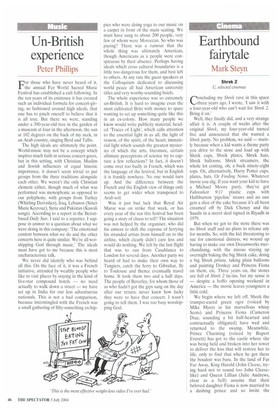Un-British experience
Peter Phillips
Elor those who have never heard of it, the annual Fez World Sacred Music Festival has established a cult following. In the ten years of its existence it has created such an individual formula for concert-giving, so fashioned around high ideals, that one has to pinch oneself to believe that it is all true. But there we were, standing under a 300-year-old tree in the garden of a museum at four in the afternoon, the sun at 102 degrees on the back of my neck, in an Arab country, singing Byrd and Tallis.
The high ideals are ultimately the point. World-music may not be a concept which inspires much faith in serious concert-goers, but in this setting, with Christian, Muslim and Jewish influences of equal historic importance, it doesn't seem trivial to put groups from the three traditions alongside each other. We weren't the only Christian element either, though much of what was performed was monophonic as opposed to our polyphony, with groups from Turkey (Whirling Dervishes), Iraq, Lebanon (Sister Marie Keyrouz), Syria and Pakistan (Kawali songs). According to a report in the Beirutbased Daily Star, I said to a reporter. I suppose in answer to a question about what we were doing in this company: 'The emotional content between what we do and the other concerts here is quite similar. We're all worshipping God through music.' The ideals must have got to me because this is most uncharacteristic talk.
We never did identify who was behind all this. On the face of it, it was a French initiative, attended by wealthy people who like to visit places by staying in the kind of five-star compound hotels — no need actually to walk down a street — we have set up in India for our less adventurous nationals. This is not a bad comparison, because intermingled with the French was a small gathering of fifty-something ex-hip
pies who were doing yoga to our music on a carpet in front of the main seating. We must have sung to about 200 people, very few of whom were Moroccan. So who was paying? There was a rumour that the whole thing was ultimately American, though Americans as a people were conspicuous by their absence. Perhaps having ideals which cross cultural boundaries is a little too dangerous for them, and best left to others. At any rate the guest speakers at the Colloquium dedicated to discussing world peace all had American university titles and very worthy-sounding briefs.
The whole experience was so extremely un-British. It is hard to imagine even the most cultivated Brits with money to spare wanting to set up something quite like this in an ex-colony. How many people we know would write publicity material, headed 'Traces of Light', which calls attention to the essential light in us all, the light of reason, of the spirit, of the heart; immaterial light which sounds the greatest mysteries of which the arts, literature, certain ultimate perceptions of science try to capture a few reflections? In fact, it doesn't come over too badly in French, which was the language of the festival, but in English it is frankly nowhere. No one would turn up. And the difference between the French and the English view of things only seems to get wider when transposed to Arab soil.
Was it just bad luck that Royal Air Maroc was on strike that week, or has every year of the ten this festival has been going a story of chaos to tell? The situation was not helped by the organiser, who did his utmost to shift the expense of ferrying his stranded artists from himself on to the airline, which clearly didn't care less and would do nothing. We left by the last flight that was to run from Casablanca to London for several days. Another party we heard of had to make their own way to Tangiers, catch the ferry to Gibraltar, fly to Toulouse and thence eventually travel home. It took them two and a half days. The people of Beverley, for whom those of us who hadn't got the gips sang on the day after our return, never knew how lucky they were to have that concert. I wasn't going to tell them. I was too busy worshipping God.


































































 Previous page
Previous page